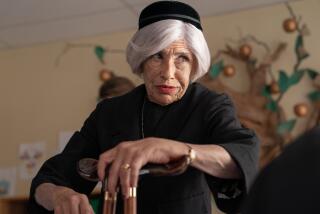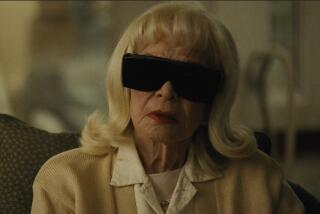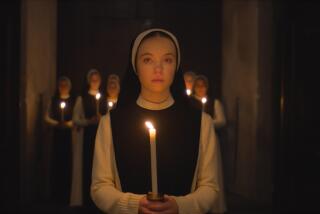‘WINDOW’--THE THEORY IS BETTER THAN PRACTICE
- Share via
Some movies have a premise so interesting that, for a while, they’re carried by it. That’s almost the case with “The Bedroom Window” (citywide), a Hitchcockian pastiche about successively deeper layers of voyeurism, terror and guilt. As in “Psycho,” writer-director Curtis Hanson takes us from adultery and deceit to murder, madness and destruction’s brink.
The premise is from a British mystery by Anne Holden, “The Witnesses,” which Hanson transfers to Baltimore. It’s about an adulteress in a jam, a murderer and yet another “wrong man.”
In the movie, Sylvia Wentworth (Isabelle Huppert)--on a fling with her husband’s top architect, Terry Lambert (Steve Guttenberg)--witnesses a near-rape from her lover’s bedroom window. For Sylvia, propriety is as strong as promiscuity. Since she won’t tell the police what she saw or where she was, Lambert--who missed everything--agrees to be her proxy: to pretend he saw it. His resolve gets stronger after a rape-murder occurs that evening, apparently the work of the same assailant--and stronger still after he meets the winsome miss, Denise (Elizabeth McGovern), who was nearly killed before Sylvia’s eyes.
But the lovers’ plan is preposterous. Before long, Lambert is a suspect himself, and Sylvia, shallow to the core, pulls away. As she does, he experiences guilt on three levels: for his actual sin (adultery), for another’s (the rape-murders), and for crimes still to come.
One guilt leads to another, and, by the end, Lambert is tangled in the murderer’s personality, the classic Hitchcockian “wrong man.” Sylvia and Denise, two opposing forces, pull him in opposite directions, toward lies and toward responsibility. And the fourth side of the quadrangle is the killer himself (Brad Greenquist).
Still, “The Bedroom Window” engrosses you in theory more than practice. As a thriller, it has elements that many recent Hitchcock pastiches have lacked: interesting characters and a somewhat complex plot. But perhaps this story simply looks good by contrast.
The movie also lacks sheer juice and voltage, or even enough perverse surprises like the kind you briefly get when Wally Shawn, as a conniving defense attorney, comes on in the courtroom scene, snarling and smirking. The actors are good. McGovern, Huppert, Shawn and Paul Shenar (as Sylvia’s husband) are all excellent, and Guttenberg is fine (a yuppie on the rack), until the last part of the film. There, logic tells you that Lambert should be in a state of mortal terror, but he shows something nearer the jitters of a premed student worrying about a pop quiz.
There’s another drawback: Hitchcock, as much as Raymond Chandler, really belongs to a specific period, a different era’s private romanticism and public morality. And “The Bedroom Window”--like dozens of others--never succeeds in updating him. It’s only an amiable try--though whenever Isabelle Huppert or Elizabeth McGovern are on screen, also a seductive one.
More to Read
Only good movies
Get the Indie Focus newsletter, Mark Olsen's weekly guide to the world of cinema.
You may occasionally receive promotional content from the Los Angeles Times.










